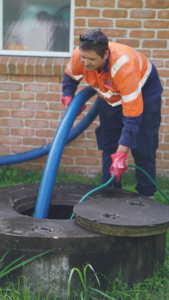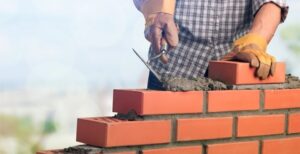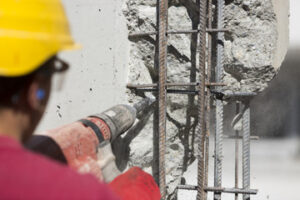Septic tanks filter and treat household wastewater. Solids in the wastewater settle to the bottom of the tank and floatable wastes, such as fats, rise to the top.
Once the septic tank is pumped, the distribution box evenly distributes wastewater to absorption fields in your yard. Keeping your septic system up to date can help you avoid water and environmental pollution, plumbing problems and an outbreak of disease. Click the Septic Tank Services Near Me to learn more.

Septic systems are used to manage waste in homes and businesses that aren’t connected to public sewer lines. They separate sludge, wastewater and scum from solid wastes. Effluent regularly exits the septic tank into a drainfield, where it is naturally filtered by bacteria before it enters groundwater supplies. The septic system should be inspected and maintained periodically to avoid expensive repairs and protect human health.
During a septic tank inspection, a professional technician checks the condition of the septic tank and piping. He or she looks for signs of leakage, and assesses the inlet and outlet baffles and distribution box to ensure they are in good condition. The inspector may also probe the leaching field to look for signs of previous ponding and evaluate the operating liquid level in the septic tank.
A septic tank inspection is outside the scope of general home inspections, and requires specific training and certification. Look for a licensed, certified professional who has experience inspecting septic systems and understands the local septic codes and regulations.
Before a septic system is inspected, the homeowner should make a map or mark out the location of the septic tank, ports, distribution box and the drainfield. This will help ensure that no one accidentally damages the septic system when doing yard work or working on home projects and will prevent vehicles, machinery and equipment from driving over or parking on the absorption field. The map can also help homeowners keep track of maintenance schedules and locate components when cleaning or pumping the septic system.
A professional septic tank service company can help with system maintenance by scheduling regular cleaning and pumping. The frequency of cleaning depends on the size of the septic tank, the number of people living in the house and the frequency of water use. A septic tank service will recommend an appropriate frequency after a thorough septic inspection.
The best way to keep a septic system functioning well is to minimize the amount of wastewater that enters it. Install water-conserving faucets and showerheads, repair leaking toilets and run washing machines only when full. Divert roof drains, surface water and sump pumps away from the septic system, and limit the amount of household chemicals entering it (bleach, disinfectants, drain and toilet bowl cleaners).
Pumping
A septic tank handles waste in homes that are not connected to the municipal sewer lines. It’s important that you keep up with regular septic system maintenance and inspections. These services help prevent costly repairs and system failure, as well as protecting the environment and your health. Septic system maintenance also helps extend the life of your septic tank, making it less likely to fail and need replacement.
One of the most important parts of septic tank care is septic system pumping and cleaning. This process removes the solid waste and some floating debris from your septic tank, which keeps it functioning properly. Regular septic tank pumping also helps prevent waste buildup, which can lead to clogs and backups in your home’s drains.
Before septic tank pumping begins, your professional septic technician will perform an initial inspection. This will help them locate the tank’s access points, which are usually manhole covers or inspection ports. They will also look for signs of sludge or scum buildup. This will inform them how much of the septic tank needs to be pumped out.
A large tanker truck with a vacuum system will then be brought to your property. The truck will have a large vacuum hose that is inserted into the septic tank through its access point. This will remove the liquid and solid waste from the septic tank and dispose of it in a safe way.
After the septic tank is pumped, your technician will then inspect it again. This is an important step because it can reveal any issues with your septic system that may need to be addressed. For example, if your septic tank has a detached dividing wall, it could trap solid waste in one of its compartments. This can cause a septic system failure, especially if the sludge ends up in your drain field.
Other common issues that indicate it’s time for septic tank pumping include slow-draining sinks, toilets, and bathtubs. You might also notice puddles of water in your yard near the septic tank or drain field. Foul odors around the septic system and drain field can also be a sign of a problem.
Cleaning
When waste leaves your home, it flows through a series of drain pipes to the septic tank. Solid waste settles in the bottom of the tank, while liquids and floating waste float to the top. Naturally-occurring bacteria in the septic tank break down these materials to produce harmless byproducts. The liquids and byproducts flow out of the septic system through a leach field into the ground.
Regular septic tank cleaning helps prevent slow drains and clogs. It also extends the life of your septic system and reduces the risk of wastewater seepage into groundwater sources, which can cause environmental pollution and health issues.
A professional septic tank cleaning involves removing all solid waste, including the accumulated sludge at the bottom of the septic tank. It also includes a thorough inspection of the tank, inlet and outlet pipes and baffles. A professional can check for cracks, wear and tear, and other signs of damage.
In addition to septic tank cleaning, homeowners should be careful about what they flush down the drains. Using non-biodegradable waste items such as cigarette butts, cotton swabs and menstrual products can clog the septic system. Grease, oils and chemicals can also thicken and clog the drains.
All septic systems require regular maintenance to function properly and avoid costly problems down the road. Keeping the tank and drain field well-maintained is the best way to avoid costly repairs and potential system failure, which can lead to wastewater seepage into the house.
The most important thing to keep in mind is to follow a professional’s recommendations on septic tank pumping and cleaning. When you’re ready for septic tank services, contact a local service provider for more information and pricing. They can help you determine the right frequency of maintenance to keep your septic tank functioning at its best. They can also offer other septic tank services, such as septic system installation and repair, to ensure your entire septic system works efficiently. With regular cleaning and pumping, you can save money on expensive repairs and extend the lifespan of your septic tank.
Repair
A septic system is a sophisticated, high-functioning piece of machinery that requires regular maintenance to work optimally. If a septic tank goes unchecked for too long, solid waste accumulates and causes clogs, backups, and other problems. These problems can ultimately lead to contaminated groundwater and surface water, which presents health hazards for your family and the surrounding environment.
Septic tank inspections and pumping are vital to maintaining a functional septic system. A professional will inspect the septic tank and drain field to make sure that everything is working as it should. This includes examining the condition of the septic tank, checking the level of sludge and scum in the septic tank, and inspecting the condition of the absorption field.
Besides pumping, there are other maintenance services to consider. For example, the baffles in your septic tank can become diseased or damaged, interfering with waste separation. Replacing the baffles is a simple yet effective way to ensure your septic system functions as it should.
Leaky or sweating septic pipes can attract tree roots, which can enter the septic tank and drain field and cause clogs. These clogs can be difficult to clear without the use of professional equipment. Professionals can use a cutting blade on a rotating auger to remove root growth and restore the proper flow of wastewater in your septic system.
An overflowing septic system can cause wastewater to spill out onto the property, which can damage the soil and cause a costly cleanup. If your septic tank is overflowing, it’s important to call a septic tank service right away to avoid expensive cleanup and repairs.
Septic systems can also become clogged with a wide variety of debris, including toys flushed down toilets by errant toddlers; feminine hygiene products; hair; and kitchen scraps. If these clogs aren’t cleared in a timely manner, they can affect your home’s plumbing, leading to slow or blocked drains and unpleasant smells. Professional septic system repair can include snaking or hydrojetting the drain lines to clear the blockage.
If you’re a septic tank service company, it’s important to have the best software to manage customer relationships and scheduling. Field service management solutions allow you to create profiles for each client, track and update the status of their septic tank maintenance, and send out invoices and reminders. These tools help you get a better handle on workload and scheduling, so you can keep your customers happy and your business running smoothly.


